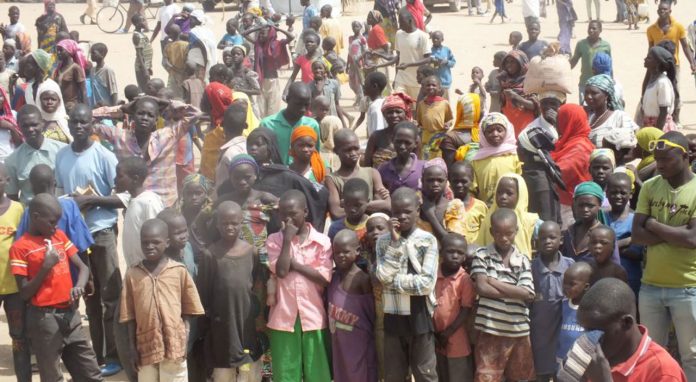Disinformation has spiraled before Nigeria’s presidential ballot on Saturday as the nation faces challenges ranging from threats from criminal gunmen to a stuttering economy and a currency crisis.
Fears of electoral fraud have also fueled false stories about candidates hoarding cash during an acute shortage of naira currency notes.
With some 39 million Nigerian social media users, these claims spread like wildfire around Facebook, WhatsApp and TikTok before the February 25 vote.
“Renewed sophistication and organisation in the push of disinformation has been observed with efforts generally focused on glorifying or delegitimizing political candidates and undermining the credibility of the Independent National Electoral Commission,” the Centre for Democracy and Development said in a report.
Candidates have been campaigning for the support of more than 93 million registered voters who will choose a successor to President Muhammadu Buhari.
The top contenders in the race are Bola Tinubu of the ruling All Progressives Congress, Atiku Abukabar of the main opposition Peoples Democratic Party and the Labour Party’s Peter Obi.
– Security threats –
Nigeria faces multiple security challenges including kidnap gangs in the northwest, intercommunal clashes and jihadists in the northeast.
Experts also warned of campaigns fanning ethnic and religious tensions in a country almost equally split between Muslim-majority north and Christian-dominated south and with dozens of ethnic groups.
One of the threats comes from separatists in the southeast.
The electoral commission said its offices have been hit by more the 50 attacks across the nation since 2019, with the majority taking place in southeastern states.
The Indigenous People of Biafra or IPOB separatist movement denies its members are responsible.
But the violence has also spurred disinformation on social media.
AFP Fact Check debunked several claims shared by accounts promoting the separatist cause of IPOB.
While one post featured photos allegedly showing the aftermath of an attack on the convoy of Labour’s Obi, another purported to prove that secessionists in the southeast had shot down a government drone.
Neither was true –- the photos turned out to be old and of unrelated incidents.
– Currency crisis –
Separatist and political violence are not the only issues threatening Nigeria’s election.
A national cash shortage, coupled with a fuel scarcity, has sparked protests in major cities, with people attacking bank buildings.
The crisis erupted after the central bank began to swap old bills of the local naira currency for new redesigns in December, creating a shortfall in banknotes.
The bank said the new policy was aimed at clearing up counterfeit naira and fighting political bribery. But many Nigerians are not convinced it will address corruption.
The situation has fuelled online rumours, including of presidential candidates hoarding money.
– Electoral fraud –
Accusations of widespread vote rigging, tallying errors and corruption have marred past ballots in Nigeria.
As a result, trust in INEC itself has dwindled. Nearly 80 percent of Nigerians distrust the organisation, according to a February report by the pan-African survey group Afrobarometer.
“Disinformation has triggered election violence in the past because people believed what they saw on social media,” said Opeyemi Kehinde of Nigeria Factcheckers’ Coalition.
The alliance, made up of a dozen local organisations, was launched to verify disinformation linked to the 2023 ballot.
“It is important for people to trust information that comes from INEC or other official sources, especially election results,” Kehinde added.
In a bid to make the 2023 ballot more fraud-resistant, Nigeria introduced technological innovations, including the bimodal voter accreditation system (BVAS), which identifies voters through facial recognition and biometrics.
But controversies have already plagued the new system.
In January, a tribunal overturned the result of Osun state’s gubernatorial election after finding that overcounting took place despite the use of BVAS.
The incident sparked disinformation online.
AFP Fact Check debunked claims that Osun’s governor had primarily been sacked over a video showing him dancing after he won the election.
Fake INEC press releases have also been widely circulated.
– Political blame-game –
Presidential frontrunners have traded accusations and blame over the cash shortages.
“We have seen an increase in election disinformation, with some candidates maligning the character of their opponents at rallies and on social media platforms,” said Kehinde of the FactCheckers’ Coalition.
Some inside the APC claimed the crisis was engineered by Buhari’s inner circle to cost Tinubu the election or spark chaos.
The presidency rejected the allegations.
The track record of Buhari’s eight-year reign also provided fodder for misleading claims.
In one recent instance, Labour Party’s Obi alleged that Nigeria’s exports under Buhari had been outshone by smaller African nations. But official data showed Obi’s figures were inaccurate.
The major parties face voter fatigue, experts warned, with turnout dropping to 34 percent in the 2019 presidential ballot.
“Most candidates have failed to tell Nigerians how they plan to address other indices, including debt profile, power, and poor infrastructure that brought the economy to its knees,” public affairs analyst Chuka Joseph said.

